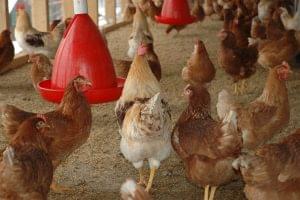The bird flu situation in Europe is still not encouraging
There has been no positive change in the bird flu situation in Europe since the beginning of September, and the wild bird migration taking place throughout the continent in the fall further increased the risk of the virus spreading. Avoiding the epidemic and protecting farm animals depends, above all, on the awareness and precautions of the poultry farmers against epidemics, for example, it is already strongly recommended that they keep the poultry indoors.

(Photo: Pixabay)
In addition, taking environmental trends into account, the authority must also be ready. And if the disease rears its head, it involves immediate measures, for example, local epidemic prevention centers are established and a special procedure is also implemented in the animal health diagnostic laboratory of Nébih.
In the past month, specialists detected the highly pathogenic avian influenza H5N1 in a total of 47 poultry farms, 37 captive bird institutions and 323 wild birds in the European Union, while the H5N5 subtype of the virus was detected in two wild birds. The countries concerned are Belgium, Denmark, Finland, France, Germany, Ireland, Iceland, the Netherlands, Poland, Norway, Italy, Portugal and Spain.
Avoiding the epidemic and protecting farm animals depends, above all, on the awareness and precautions of poultry farmers against epidemics
For now, it is only recommended, but it is expected that it will soon be mandatory to keep poultry indoors again. And although Hungary regained its bird flu-free status in July of this year, the experts of the National Food Chain Safety Office (Nébih) must be on constant alert. A possible outbreak of an epidemic brings with it immediate measures. These include, for example, the establishment of local epidemic prevention centers, but also the implementation of a modified laboratory sample handling procedure, for the sake of a quick and efficient procedure. The essence of the latter is that in the event of an avian flu epidemic, the PCR test and the results will be reported on the same day for the samples brought in personally by the customers, if the test samples arrive at the animal diagnostic laboratory of Nébih by 10 a.m. at the latest. In the case of samples brought in by a sample transport vehicle, the PCR test and results are reported the day after arrival.
Preventing bird flu and maintaining our free status is in the common interest of all players in the sector. It is important that each actor performs his own “task” during the defense, for which additional useful information can be found on the thematic subpage of Nébih: https://portal.nebih.gov.hu/hu/madarinfluenza
Nébih
Related news
From ham to egg dye – comprehensive Nébih inspection continues until Easter
🎧 Hallgasd a cikket: Lejátszás Szünet Folytatás Leállítás Nyelv: Auto…
Read more >What goes on a dog’s plate? Here’s the test of dog salami!
🎧 Hallgasd a cikket: Lejátszás Szünet Folytatás Leállítás Nyelv: Auto…
Read more >AM: from ham to egg dye, comprehensive Nébih inspection is underway until Easter
🎧 Hallgasd a cikket: Lejátszás Szünet Folytatás Leállítás Nyelv: Auto…
Read more >Related news
(HU) Átadták a SIRHA Budapest 2026 Innovációs Termékverseny díjait
🎧 Hallgasd a cikket: Lejátszás Szünet Folytatás Leállítás Nyelv: Auto…
Read more >How does the forint exchange rate affect consumer prices?
🎧 Hallgasd a cikket: Lejátszás Szünet Folytatás Leállítás Nyelv: Auto…
Read more >HELL CITY has arrived, led by Michele Morrone
🎧 Hallgasd a cikket: Lejátszás Szünet Folytatás Leállítás Nyelv: Auto…
Read more >








